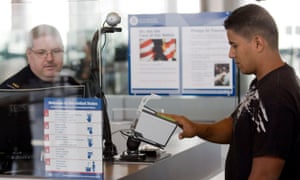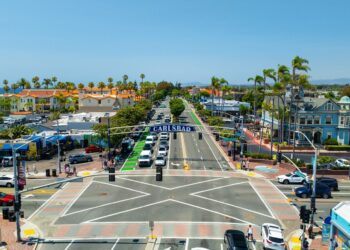
The US government has begun asking select foreign travelers to disclose their social media activities as part of an expanded effort to spot potential terrorist threats.
The request functions as a prompt on the online Electronic System for Travel Authorization, or Esta, a visa waiver application that many visitors are required to submit before travelling to the US. The choices include platforms such as Facebook, Twitter, Google+, Instagram, LinkedIn and YouTube, and additional space for applicants to input their account names on those sites.
The Customs and Border Protection, which began the program last week, has previously said it wouldn’t prohibit entry to foreigners who didn’t provide their social media account information.
The government has faced a barrage of criticism since it first floated the idea last summer. Privacy rights activists say there are few guidelines about how the information, once obtained, is used or shared with other agencies.
The proposal filed with the US Federal Register states that the collection of social media data was intended to “enhance the existing investigative process and provide Department of Homeland Security (DHS) greater clarity and visibility to possible nefarious activity and connections by providing an additional tool set which analysts and investigators may use to better analyze and investigate the case”.
The Internet Association, which represents companies including Facebook, Google and Twitter, has argued that policy threatens free expression.
Michael W Macleod-Ball, chief of staff for the American Civil Liberties Union’s Washington office, told Politico last week: “While the government certainly has a right to collect some information … it would be nice if they would focus on the privacy concerns some advocacy groups have long expressed.”
Over the summer, the ACLU and the Center for Democracy and Technology warned that the new request potentially offered government agencies “gateways into an enormous amount of [users’] online expression and associations, which can reflect highly sensitive information about that person’s opinions, beliefs, identity and community”.
The groups warned that the program would “fall hardest on Arab and Muslim communities, whose usernames, posts, contacts and social networks will be exposed to intense scrutiny”.
A spokesperson for the internet privacy group Access Now told Politico the group feared that the choice to hand over social media information was not really a choice at all, and that the program could act as an opaque entry point for more exacting probes.
“The process to enter the US is confusing, and it’s likely that most visitors will fill out the card completely rather than risk additional questions from intimidating, uniformed officers – the same officers who will decide which of your jokes are funny and which ones make you a security risk,” explained Nathan White of Access Now.
Current programmes believed to be deployed by DHS include the ability to scan a limited amount of social media posts.
The US government approves around 10m visa applications a year and had 77.5 million foreign visitors in 2015. Collecting social media accounts for all visitors could produce one of the largest government-controlled databases of its kind almost overnight.













